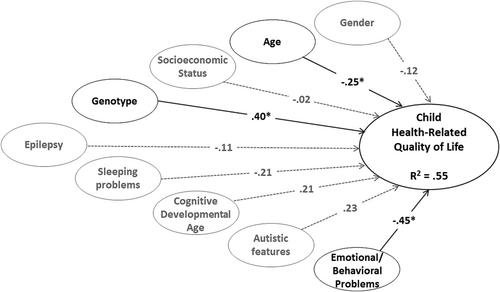Child characteristics associated with child quality of life and parenting stress in Angelman syndrome
Abstract
Background
Angelman syndrome (AS) is a rare neurodevelopmental disorder characterised by severe intellectual disability, movement disorder, epilepsy, sleeping problems, and behavioural issues. Little is known on child health-related quality of life (HRQoL) in AS. AS family studies have reported elevated parenting stress and a high impact of the child's syndrome on the parent. It is unclear which factors influence child HRQoL and parenting stress/impact in AS.
Methods
We collected data prospectively through standardised clinical assessments of children with AS at the ENCORE Expertise centre for Angelman Syndrome at the Erasmus MC Sophia Children's Hospital. A linear regression analysis was conducted for the following outcome variables: (1) child HRQoL (Infant and Toddler Quality of Life Questionnaire); (2) the impact of the child's syndrome on the parent (Infant and Toddler Quality of Life Questionnaire); and (3) parenting stress (Parenting Stress Index). Predictor variables were child genotype, epilepsy, sleeping problems (Sleep Disturbance Scale for Children), cognitive developmental level (Bayley Cognition Scale), autistic features (Autism Diagnostic Observation Schedule) and emotional/behavioural problems (Child Behaviour Checklist). Covariates were sex, age and socio-economic status.
Results
The study sample consisted of 73 children with AS, mean age = 9.1 years, range = 2–18 years. Emotional/behavioural problems were the strongest significant predictor of lowered child HRQoL. Internalising problems were driving this effect. In addition, having the deletion genotype and higher age was related to lower child HRQoL. Sleeping problems were related to a higher impact of the child's syndrome on the parent. Finally, emotional/behavioural problems were associated with higher parenting stress. Cognitive developmental level, autistic features and epilepsy were not a significant predictor of child HRQoL and parenting stress/impact.
Conclusions
These results suggest that interventions aimed at increasing child HRQoL and decreasing parenting stress/impact in AS should focus on child emotional/behavioural problems and sleeping problems, using a family-centred approach.


 求助内容:
求助内容: 应助结果提醒方式:
应助结果提醒方式:


